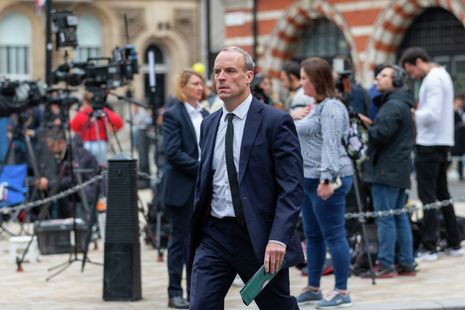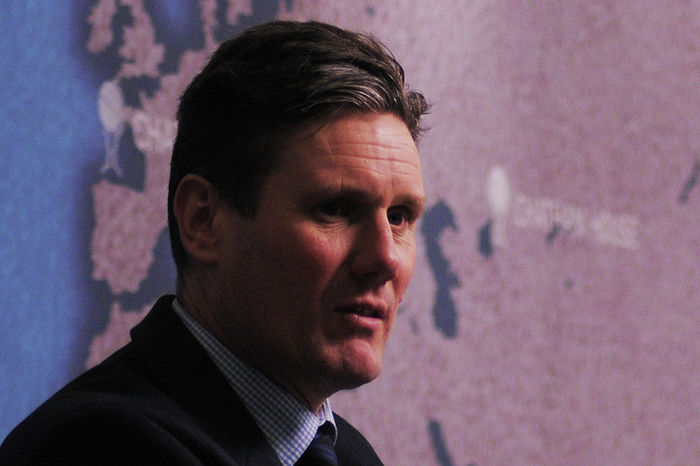Accountability doesn’t come on a silver platter: we must fight for it
After some high profile resignations in British politics, Joseph Duffy is hopeful for accountability’s future

Accountability is not a right, not a given, but a necessity which must be fought for to achieve any good social system. It’s everywhere in life: your University society whose statutes you must abide by or the committee will remove you; the laws of the land you must follow or the police will arrest you; the parliament you work in whose rules are the cornerstone of democracy which you must follow or… well, that’s the issue these days. Or, what?
Richard Sharp resigned as chair of the BBC recently, mirroring other instances of important healing in the nature of British politics following extensive periods of corruption and misdirection. You probably didn’t need an investigation to tell you that Johnson “personally approv[ing] Sharp’s appointment” after Sharp helped Johnson secure a huge loan likely creates a conflict of interest, but it was necessary to force Sharp’s resignation.
Politics’ wounds aren’t healing naturally; there is a corrupt, self-serving belief ingrained in politics that those in power have a divine right to be there, and as such accountability has always been ‘Public Enemy No. 1’ to these people. Politics is healing because those in power are being reminded we put them there, and there are standards which they must meet if they wish to stay.
“The only people running scared are those whose closets are fit-to-bursting with skeletons”
Evidence of our political immune system getting back to life can be seen in side-effects such as Deputy PM Raab resigning. After the investigation into his behaviour upheld two complaints of bullying which he denied, Dominic Raab did not go quietly. To make sure the whole country knew he was actually just a ‘really nice guy’ who was the innocent victim of a witch hunt, Raab penned an article in The Telegraph with the headline “the people of Britain will pay the price for this”. All guns blazing is not the only way to dodge accountability, as we found out when a sudden resignation from Sturgeon may not have been as innocent as it originally appeared, given the police are investigating potential financial fraud in the SNP. While Raab may try to scare us with his words, this is a sign that in fact the only people running scared are those whose closets are fit-to-bursting with skeletons.
In the very heart of politics, accountability is beginning to make a comeback. MPs have started to once again hold their fellow members to account, and leaders have shown strength in removing those who become indefensible. Fabricant told Badenoch he was “growing increasingly concerned that trans people are becoming demonised”; Starmer removed the whip from Abbott following her claims that Jewish, Irish, and Traveller people weren’t subject to racism; Bridgen was expelled permanently after comparing Covid-19 vaccines to the Holocaust.
While these signs of healing are becoming more salient, accountability is not safe, and we must not rest on our laurels. The problem with these soft power systems is that, all too often, the defendant is powerful enough to flat out refuse to comply. Johnson only left government after 59 governmental departures, and even then stayed on as interim, refusing to acknowledge the fat lady was well into the chorus of her singing.
“It seems every time we let corruption take an inch, it takes 100 miles”
This is why it is devastating to see so many turn their backs on our final line of defence against flat-out corruption; the strongest systems of investigation, like standards committees and courts, are the most vital cornerstones of democracy. Unfortunately, whether it’s the civil service, lefty lawyers, calls of ’kangaroo courts’, or even deadcatting a curry and a beer, efforts are already well underway to try and delegitimise everything about recent serious investigations. Rather than holding your hands up and aiming to correct mistakes, the tendency in British politics is to obfuscate.
It seems every time we let corruption take an inch, it takes 100 miles. If we allow accountability-dodgers to cast doubt and blame over our institutions of integrity like the Civil Service and Justice System which serve the people, can we really say we’ll still be living in a democracy? If we still value truth, honesty, and integrity from our governments, we must fight to defend and uphold accountability, not shy away from it.
Nature is healing in the political world, and accountability is running its course thanks to the systems we have in place and champions of accountability fighting its corner — but it remains under threat. If we don’t keep an eye on these institutions, and encourage this revival of more responsible politics, it may slip away before we even knew it was there. While Sunak is investigated for once again giving government funding to companies his wife has stakes in, and Starmer is criticised for reneging on several key pledges, we must remember that accountability is a necessity we must fight for, not one that is given freely.
 News / Cambridge academics stand out in King’s 2026 Honours List2 January 2026
News / Cambridge academics stand out in King’s 2026 Honours List2 January 2026 Interviews / You don’t need to peak at Cambridge, says Robin Harding31 December 2025
Interviews / You don’t need to peak at Cambridge, says Robin Harding31 December 2025 Comment / What happened to men at Cambridge?31 December 2025
Comment / What happened to men at Cambridge?31 December 2025 News / Varsity’s biggest stories of 202531 December 2025
News / Varsity’s biggest stories of 202531 December 2025 News / Unions protest handling of redundancies at Epidemiology Unit30 December 2025
News / Unions protest handling of redundancies at Epidemiology Unit30 December 2025










